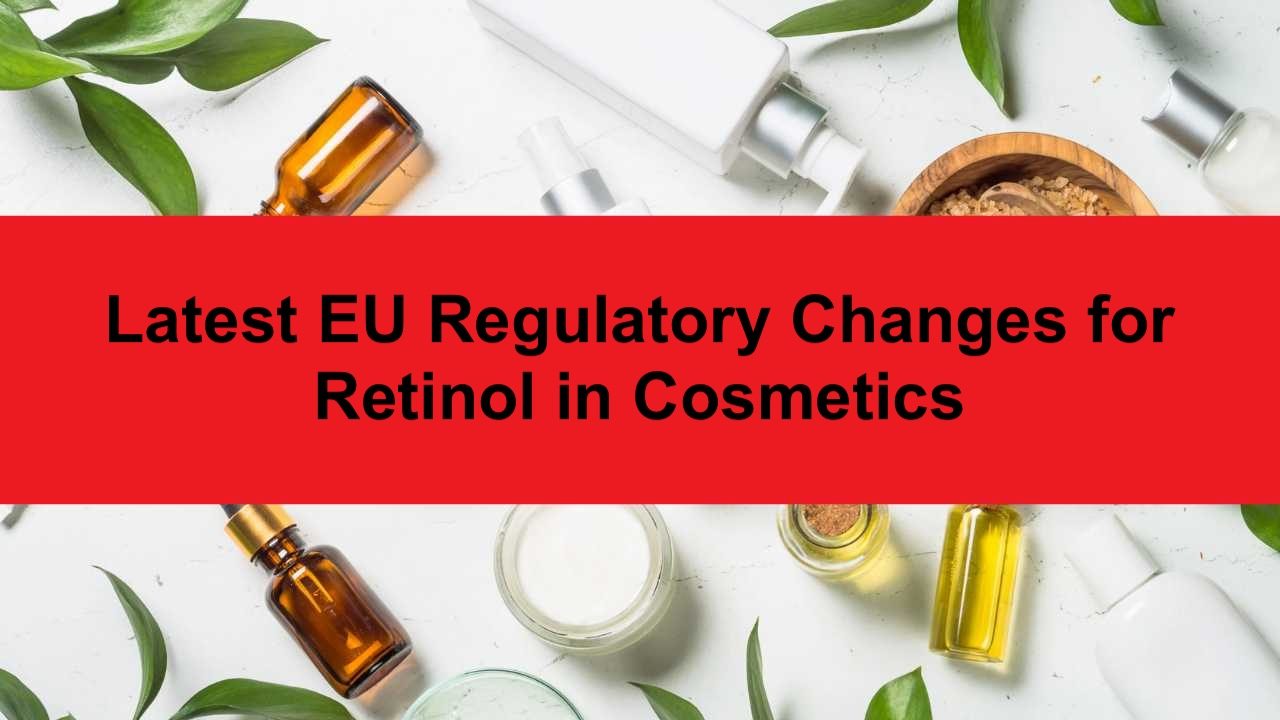Retinol and related vitamin A compounds have long been popular active ingredients in skincare. However, due to concerns about cumulative vitamin A exposure, the European Union has recently updated its Cosmetics Regulation (EC) No 1223/2009 to impose specific concentration limits and mandatory consumer warnings.
What is Retinol?
Retinol is a derivative of vitamin A commonly used in cosmetic formulations. It belongs to a family of compounds known as retinoids, which also includes retinyl esters such as retinyl acetate and retinyl palmitate. These compounds are valued in skincare due to their ability to interact with skin cells at a molecular level. Retinol is typically formulated at carefully controlled concentrations to ensure both effectiveness and skin tolerance.
Benefits of Retinol in Cosmetics
Retinol is widely recognised in skincare for its ability to support skin health and appearance. One of its primary benefits is promoting cell turnover. By encouraging the shedding of old, dull surface cells and replacing them with new ones, retinol helps maintain smoother and fresher-looking skin.
Another significant benefit is its role in supporting collagen production. Collagen is a protein that provides structure and elasticity to the skin. Retinol helps stimulate collagen synthesis, improving skin firmness and reducing the appearance of fine lines over time.
Retinol is also effective in addressing uneven skin tone and pigmentation issues. It helps fade dark spots and discoloration caused by sun exposure or hormonal changes, resulting in a more even complexion. Additionally, its antioxidant properties help neutralize free radicals, protecting the skin from environmental stressors like Ultra-violet (UV) radiation and pollution.
Overall, Retinol contributes to improving overall skin texture giving the skin a more balanced and youthful appearance.
EU Regulation on Retinol in Cosmetics
In April 2024, the European Commission adopted Commission Regulation (EU) 2024/996, amending Annex III of Regulation 1223/2009 to restrict retinol and related substances retinyl acetate, and retinyl palmitate to the following limitations:
Body Lotion Restriction
Retinol, retinyl acetate, and retinyl palmitate are restricted in body lotions to 0.05% Retinol Equivalent (RE).
Other leave-on Rinse-off products
In other leave-on or rinse-off products (including facial creams and serums), the limit is 0.3% RE.
Labelling
All products containing these ingredients must include new labeling: “Contains Vitamin A. Consider your daily intake before use.” This is intended to alert consumers to cumulative exposure risk from supplements and diet.
Important deadlines
From 1 November 2025, products placed on the EU market must already meet these concentration and labelling rules.
By 1 May 2027, all non-compliant products must be withdrawn or reformulated.
Challenges and Future Outlook
This regulation means cosmetic companies will need to reformulate some of their products to fit the new limits. They will also have to update packaging and labels to include the new statement.
For consumers, it may mean fewer high-strength retinol options in stores.
It is believed these rules will make skincare safer overall, but we might also see more research and discussion about how much vitamin A is safe to use daily.
Conclusion
The recent EU updates on retinol regulation highlight the growing importance of scientific research and consumer safety in the cosmetics industry. As regulatory standards evolve, they push brands to invest in more thorough testing, transparent communication, and innovative ingredient development. This ongoing process not only ensures safer skincare but also encourages advancements in cosmetic science, paving the way for next-generation solutions tailored to diverse skin needs.
Useful Links
European Commission. (2024a). Commission Regulation (EU) 2024/996 of 3 April 2024amending Regulation (EC) No 1223/2009 as regards the use of Vitamin A, Alpha-Arbutin and Arbutin and certain substances with potential endocrine disrupting properties in cosmetic products. Official Journal of the European Union. Retrieved from https://eur-lex.europa.eu/eli/reg/2024/996/oj/eng
European Commission. (2024b). Annex III amendments to Regulation (EC) No 1223/2009: Maximum concentrations of Retinol, Retinyl Acetate, and Retinyl Palmitate in cosmetic products. Official Journal of the European Union. Retrieved from https://eur-lex.europa.eu/eli/reg/2024/996/oj/eng
European Commission. (2024c). Implementation timeline of Regulation (EU) 2024/996: Compliance and withdrawal deadlines. Official Journal of the European Union. Retrieved from https://eur-lex.europa.eu/eli/reg/2024/996/oj/eng
Scientific Committee on Consumer Safety (SCCS). (2022). Opinion on the safety of Vitamin A (retinol, retinyl acetate, retinyl palmitate) in cosmetic products (SCCS/1639/21). European Commission. Retrieved from https://health.ec.europa.eu/publications/sccs-opinion-vitamin-cosmetic-products_en



Comments are closed here.